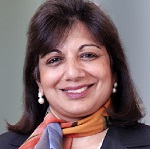SINGAPORE--India's Biocon held a busy earnings call on Jan. 23 that highlighted extensive spending on research and keeping several deals rolling, though the company remained tight-lipped on a possible license to make Gilead's ($GILD) chronic hepatitis C (HCV) products and said it will sell a 10% to 15% stake in its research services arm Syngene through an initial public offering.
Biocon, through its wholly owned subsidiary Biocon Research, had sold a 10% stake in Syngene International (Syngene) earlier this month, with Peter Bains, director of Syngene also commenting on the call that the unit delivered 20% growth in the third quarter of the company's financial year ending March 31 and is "on track to deliver the guidance of full-year revenues in the high teens."
 |
| Kiran Mazumdar-Shaw |
Kiran Mazumdar-Shaw, Biocon chairwoman and managing director, said on the Jan. 23 call that the company has many irons in the fire.
"Listing of Syngene is an important and much awaited event, which will help us unlock value of this business that is not fully captured at the moment. The proceeds from the offer of sale will help fund Biocon's requirement for cash, both for its R&D and CapEx requirements."
She added that the spending has hit the bottom line.
"Our R&D spends have seen a sharp increase this quarter, where we have incurred a total spend of ($10.7 million). Of this amount, ($7.7 million) was reported in the P&L, which is approximately 9% of the Biopharmaceutical segment sales."
Mazumdar-Shaw cited headwinds in the Middle East and the need to have a new plant underway in Malaysia up and running to overcome the situation on costs.
"In our biopharma business, we continue to work towards shifting sales lost from our Middle East markets, not on account of demand, but really due to the high credit risk that prevails in these parts of the world," she said on the call.
"The regulatory process for qualifying our products in these newer geographies is ongoing and we expect approvals to come through in coming quarters," she said. "We are confident that the expected regulatory approvals in many of our LATAM countries and other emerging markets, together with increased capacity once Malaysia kicks in will help us deliver double-digit growth in this business. Branded formulations India and research services will continue to be the growth drivers for Biocon until then."
She said the plant should be ready by the end of March, but drug sales will take some time.
"This will herald the start of a series of operational processes required for regulatory inspections. I would also like to comment that our efforts of licensing our anti-CD6 monoclonal antibody, itolizumab is gaining some progress, but our potential licensee requires certain regulatory clearances and this is actually therefore delaying the conclusion of this licensing arrangement, and we expect that this will take a little more time."
Without specifically mentioning Gilead ($GILD), Mazumdar-Shaw talked about reports of a license deal.
"This is something that we are looking forward to concluding with a potential partner," she said.
"But the partner requires to get some regulatory clearances on account of certain aspects of the asset and so until they get that we are not in a position to conclude the deal. So it could happen now, it could happen in a few months' time. But there is no certainty as to what is the time in which they can get that approval.
However, the company said it remains an active player in biosimilar work, though again skittish on candidates.
"We can't name them, but you know that we have a pipeline of biosimilars," Mazumdar-Shaw told analysts. "So, some of these have now entered the clinic globally. So, that's why we are just mentioning that."
But when pressed if they came out of a partnership with Mylan ($MYL), Mazumdar-Shaw confirmed the origin.
"Yes. These are all partnership with Mylan."
In February 2013 the companies entered into an agreement to develop and market Biocon's biosimilar versions of three insulin analogue products with the targets Eli Lilly's ($LLY) Humalog (insulin lispro), Novo Nordisk's ($NVO) NovoLog (insulin aspart) and Sanofi's ($SNY) Lantus (insulin glargine).
Under the terms of the agreement, U.S.-based Mylan will have the rights to develop and market Biocon's biosimilar versions of the three insulin analogue products, with both companies sharing development, capital and certain other costs to bring the products to market.
Sameer Baisiwala of Morgan Stanley asked about itolizumab (Alzumab) a monoclonal antibody developed by Biocon in India and whether there would be full blown clinical trials for overseas markets. But Mazumdar-Shaw declined to elaborate.
The company's net profit fell 13% to 910 million rupees ($14.8 million) on sales of 7.79 billion rupees.
- here's the release